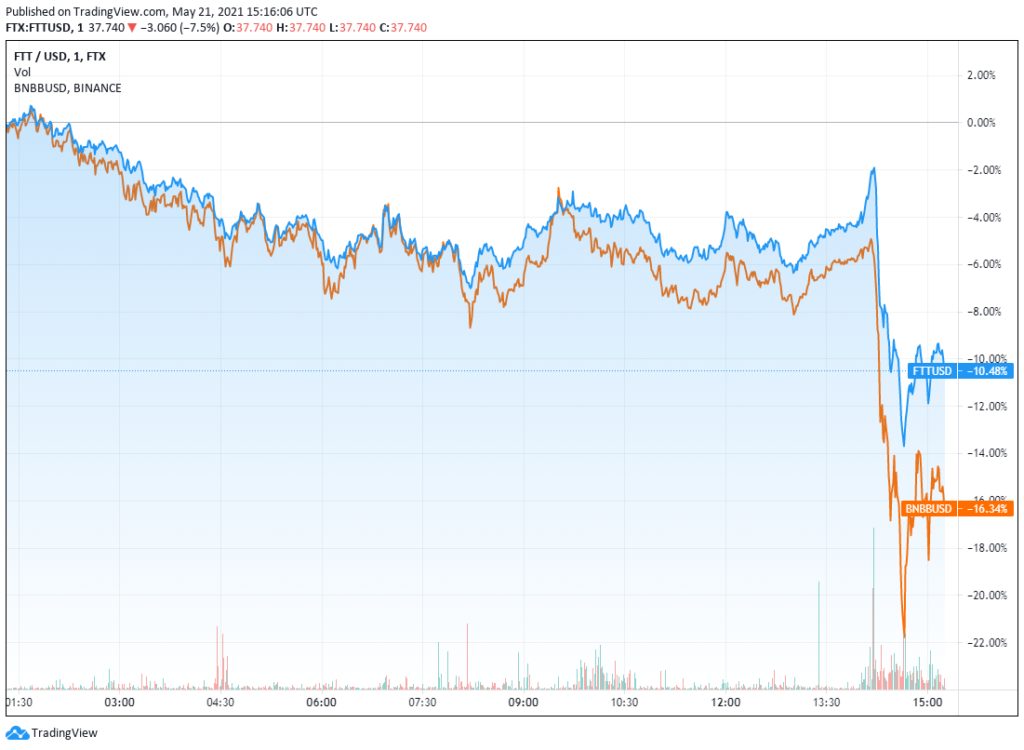FTX Token FTT Down Nearly 10% Despite Fundraise News
Reports that digital assets derivatives exchange FTX is raising between $400 million to $1 billion at a $20 billion valuation comes during an overall bear market and on news of a potential IRS crackdown on crypto.

sam bankman-fried, founder, FTX; Source: Sam Bankman-Fried
- The Block reported that FTX is in the process of closing a funding round valuing the company at $20 billion
- A general bear market in crypto, potential for an IRS crackdown, and comments by Ethereum founder Vitalik Buterin that cryptocurrency was in a bubble all make for an unfavorable market
News that FTX is on the verge of closing a major funding round that values the exchange at $20 billion, with the capital earmarked for invading Wall Street, should have been a bullish signal for the market, especially at the tail-end of a volatile week.
But instead, FTX’s own FTT token is down nearly 10%, accelerating faster than the overall market decline, in the last 24 hours (see chart below for FTT/USD).

The Block’s reporting comes as the market experiences a challenging dip that some have called the beginning of a bear market.
Within the last 10 days Elon Musk, once a bitcoin evangelist, disavowed bitcoin; Beijing reiterated that China’s ban on bitcoin remains and has been expanded to new digital asset products; the IRS got an expanded mandate and ammunition to fight money laundering and tax fraud that occurs via cryptol; and now Ethereum founder Vitalik Buterin joined the fray with talk of a “bubble”.
“Often enough, the reason the bubbles end up stopping is because some event happens that just makes it clear that the technology isn’t there yet,” Buterin said on CNN adding that concerns over bitcoin’s energy consumption were legitimate.
“The resource consumption is definitely huge. It’s not the sort of thing that’s going to break the world by itself, but it’s definitely a significant downside,” he continued. “We go from consuming the same energy as a medium-sized country to consuming the same energy as a village. If Bitcoin sticks with its technology exactly as it is today, there’s a big risk it will get left behind.”
Eyeing US expansion
FTX says it doesn’t allow US residents to trade on its platform, much like Binance and some other offshore digital assets exchanges. But also like Binance, FTX operates a regulatory compliant platform called FTX.US
In late March, the company announced that it had acquired naming rights for the Miami Heat Arena for $135 million. A few weeks later, FTX announced it had hired former Citadel Securities executive Brett Harrison to be the president of FTX.US and scale the operation.
FTX.US only has a fraction of the volume its mothership does, coming in at $354 million.
Small but mighty
One of the nuggets in The Block’s report comes from the revenue the exchange brings in through fees, which is estimated to hit $400 million in 2021 up from $85 million in 2020. In comparison, FTX brought in $85 million in fee revenue last year.
Coinbase, for its part, brought in $1.8 billion in revenue in the last quarter according to its most recent earnings report.
But things get interesting when you compare the company structures. FTX is a lean machine, not as reliant on trading fees. According to LinkedIn, the company has a headcount of 63 whereas Coinbase has over 1,700.
FTX posts 24 hour trading volume of $16 billion, according to CoinGecko, while Coinbase has around $8.3 billion.
The difference between the two companies is that FTX isn’t as reliant on trading fees to drive its business. It has a diverse array of products such as lending, staking and a buffet of derivatives markets including non-crypto commodities like oil and lumber.
FTX traded $100 billion worth of bitcoin futures in April, which is something that Coinbase is simply not allowed to do in order to remain compliant with the CFTC.
At the same time, analysts have pointed out that Coinbase’s flaw — and perhaps the reason its stock didn’t hit the stratosphere after listing — is its lack of diverse revenue streams. When the inevitable fee compression comes, analysts say, COIN will be hurt the hardest.
A big part of FTX’s strength is it doesn’t operate with the same regulatory weight as Coinbase. FTX is incorporated in Antigua and Barbuda with offices in Hong Kong, while Coinbase is US-based and regulated.
In Coinbase’s S-1 the company complained that it has to compete against the likes of unregulated, off-shore exchanges.
“Our primary source of competition to date has been from companies, in particular those located outside the United States, who are subject to significantly less stringent regulatory and compliance requirements in their local jurisdictions,” the filing reads.






